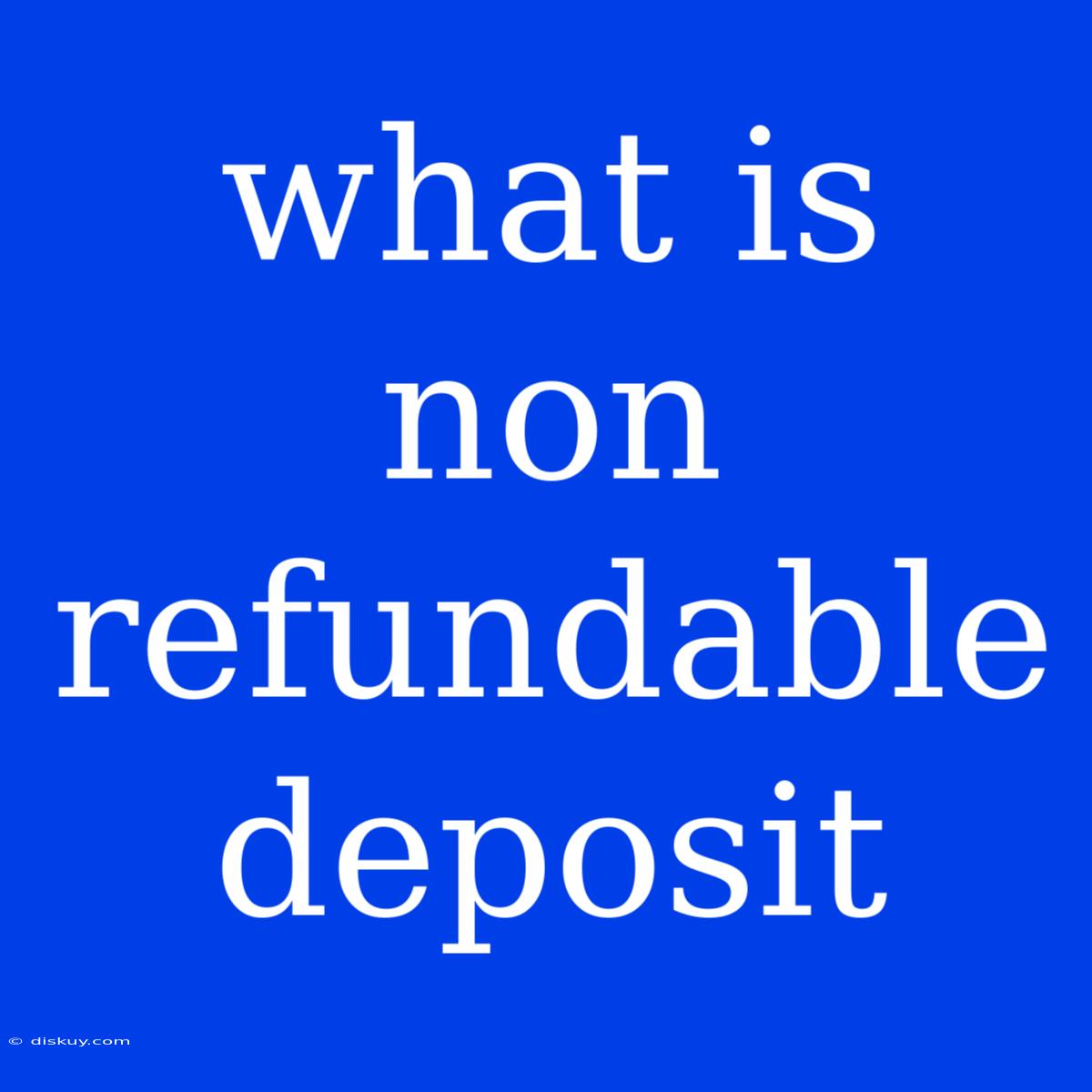What is a Non-Refundable Deposit: Unlocking the Terms and Conditions
Have you ever booked a trip, rented a property, or signed a contract and been asked for a non-refundable deposit? This seemingly straightforward term can hold a lot of weight in contractual agreements. Understanding the ins and outs of non-refundable deposits is crucial for making informed decisions.
Editor Note: Non-refundable deposits are a common practice across various sectors, from travel and hospitality to real estate and services. Learning about their intricacies can empower you to negotiate better terms and avoid potential financial pitfalls.
Why is this important? Non-refundable deposits are an integral part of many transactions, influencing your financial obligations and the potential for recovering your funds. Understanding the conditions, implications, and best practices surrounding these deposits can safeguard your financial interests and ensure a smooth and transparent experience.
Analysis: To understand non-refundable deposits, we delved into various legal frameworks, industry practices, and consumer protection regulations. We compiled this guide to demystify the concept, outlining its core aspects and offering actionable insights for navigating situations involving non-refundable deposits.
Key Takeaways:
| Aspect | Description |
|---|---|
| Definition | A non-refundable deposit is an upfront payment that cannot be returned, even if you cancel your booking, service, or contract. |
| Purpose | It secures your place, guarantees your commitment, and helps cover potential costs for the provider. |
| Legal Implications | These deposits are usually governed by contractual agreements, outlining specific terms and conditions. |
| Consumer Protection | While non-refundable deposits are common, there are some legal safeguards to protect consumers. |
Non-Refundable Deposits: A Deep Dive
Introduction: Understanding the nuances of non-refundable deposits is essential for both individuals and businesses. It's crucial to understand the legal framework surrounding these deposits, the scenarios in which they're used, and the implications for both parties involved.
Key Aspects:
- Legal Framework: The legal framework around non-refundable deposits varies by jurisdiction. In some cases, consumer protection laws may provide certain safeguards, like partial refunds or exceptions in specific circumstances.
- Industry Practices: Different industries have different standards for non-refundable deposits. For instance, the travel industry might have stricter policies compared to real estate rentals.
- Contractual Agreements: The terms and conditions surrounding non-refundable deposits are typically outlined in written contracts. Carefully review these agreements before committing.
- Consumer Rights: Depending on your location and the type of transaction, you might have certain rights regarding non-refundable deposits.
Non-Refundable Deposit Scenarios
Introduction: Non-refundable deposits are often used in various scenarios, each with its own set of terms and considerations. It's crucial to familiarize yourself with these scenarios to make informed decisions and protect your interests.
Facets:
- Travel and Hospitality: Airlines, hotels, and travel agencies frequently require non-refundable deposits for bookings. This ensures they receive payment for the services provided, even if you cancel your trip.
- Real Estate: Non-refundable deposits are often required for securing a rental property or for placing an offer on a property. These deposits help cover the costs of preparing the property for you.
- Services: Many service providers require non-refundable deposits for services like website design, software development, or event planning. This ensures that they are compensated for the time and effort invested in your project.
Summary: While non-refundable deposits can be a source of concern for consumers, they are often a necessary part of securing services and commitments. Understanding the underlying reasons for their use, the legal framework, and the specific terms of each agreement can help you navigate these transactions effectively.
FAQ
Introduction: This section addresses some common questions and misconceptions about non-refundable deposits.
Questions:
- What are the legal implications of a non-refundable deposit?
- Non-refundable deposits are often legally binding and enforceable as part of a contract. It's essential to review the terms carefully.
- Are non-refundable deposits always justified?
- While they are often used to cover potential costs, some situations may be deemed unfair or exploitative.
- Can I ever get my non-refundable deposit back?
- In some cases, depending on the contract and the specific circumstances, you might be able to request a partial refund or negotiate a cancellation fee.
- What if I need to cancel a service or booking?
- Refer to the terms and conditions of the contract to understand your rights and obligations when canceling.
- How can I avoid non-refundable deposits?
- Look for alternative options, negotiate alternative payment methods, or consider booking last minute, as those options may not require a non-refundable deposit.
- What are the benefits of non-refundable deposits for businesses?
- Non-refundable deposits help businesses secure revenue, reduce risk, and allocate resources more effectively.
Summary: Understanding the legal framework, your rights, and the terms of each contract are crucial for navigating non-refundable deposits effectively.
Tips for Non-Refundable Deposits
Introduction: While non-refundable deposits are sometimes unavoidable, there are strategies you can use to protect your interests.
Tips:
- Read the fine print: Carefully review the terms and conditions surrounding any non-refundable deposit.
- Ask questions: Don't hesitate to ask questions about the deposit, cancellation policies, and potential exceptions.
- Consider insurance: Travel insurance or other relevant insurance policies might help you recover some of your losses.
- Negotiate: Depending on the situation, you might be able to negotiate a partial refund or a different cancellation policy.
- Seek legal advice: If you feel that the terms are unfair or that you've been misled, consult with a lawyer.
Summary: By being proactive and informed, you can minimize the risks associated with non-refundable deposits and ensure a more positive and transparent experience.
Conclusion
Non-refundable deposits are a common practice in various industries, offering both benefits and potential downsides for consumers. Understanding the nuances of these deposits, the legal framework, and your rights can help you make informed decisions and protect your financial interests. By diligently reviewing contracts, asking questions, and being prepared, you can navigate these situations effectively and confidently.

